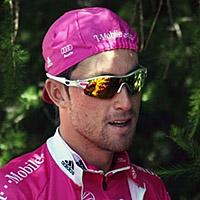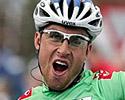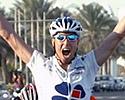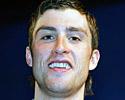
Recently on Cyclingnews.com |
An interview with Bernhard Eisel, December 1, 2007.
It's all about the Classics
The 2006 edition of Paris-Roubaix had many memorable moments: George Hincapie's epic crash, that infamous train crossing incident, and not least the ride of Fabian Cancellara. Not far behind the chaos, however, was Bernhard Eisel, whose fifth place finish earned him immediate attention from T-Mobile, with a contract following soon afterwards. And despite a less than ideal first season, the Austrian is already making plans for 2008, as Cyclingnews contributor Sarah Staber found out.
 |
The decision to switch from Française des Jeux, a team he'd ridden for since 2003, to one of cycling's powerhouse teams was an easy one. Long before the September announcement, Eisel had signed on the dotted line with T-Mobile - an agreement that was still honoured after the internal housekeeping and management shakeup from the Jan Ullrich saga took place.
Eisel's 2007 season started well enough, taking T-Mobile's first season victory on stage two of the Tour of Algarve. However, the planned splash at the Spring Classic never materialised, and despite back-to-back victories at the Commerce Bank Triple Crown series over in Philadelphia, 2007 was not a happy time for Eisel or his magenta squad. Doping revelations followed by accusations and more revelations came like an earthquake with many aftershocks, ending in the abrupt reality of title sponsor Deutsche Telekom finally losing patience this week and ending its 16-year relationship with professional cycling.
"Everything we needed was there for us - trainers, all the testing we wanted, really good physiotherapists - like Bob said, 'we want to make the best team and for the best team you need the best guys'."-Eisel was extremely impressed with team manager Bob Stapleton's management style. |
Over a morning coffee in Klagenfurt, Austria, where Eisel makes his home with long-term girlfriend Birgit, the 26 year-old reflected on his past year with Die Mannschaft [the team] and talked positively about the upcoming season. "The move to T-Mobile was absolutely the best thing I could have done," began Eisel. "There aren't a lot of teams that are this professional. I was with Mapei Quick.Step in 2001 - 2002 and we had no budget. There it was like, 'this is the money we have at the moment, if you need more we will try to get more.'
"At T-Mobile you got everything you needed," he continued. "If you explained to [T-Mobile team manager] Bob Stapleton that some special material was needed for training or a specific bike would help, he found a way to get it, either through a sponsor or he bought it. Everything we needed was there for us - trainers, all the testing we wanted, really good physiotherapists - like Bob said, 'we want to make the best team and for the best team you need the best guys'. The structure was just solid."
That solid structure was made possible through Stapleton's positive leadership skills, an approach honed in the business world as a communications executive within T-Mobile's US division. "Bob is really accessible," said Eisel. "At meetings he listens to what we, as riders, have to say. We can call him or e-mail him. He wants to learn and to change things. That gives us a really positive feeling."
 |
Of course, the picture has changed somewhat in recent days, and even Stapleton has stated that the new Team High Road will have to tighten its financial belt without the deep pockets of T-Mobile to back it up. But Eisel remains positive, "Bob is a clever fox," he recently told Austria's Sport 1. "I expect he already has a plan on the back burner."
Looking ahead to his role next year, Eisel predicts little change with Stapleton remaining at the managerial helm. "It will be pretty much like this year," he said. "I'm kind of an in-between for the old and the young guys. Next year I will be in my eighth year of professional cycling so, even if I am just 26, I have a lot of experience. I know what it means to be professional.
"It is sometimes easier for Mark [Cavendish] to listen to me than to some of the older guys. I also need to continue to be a team player. Mark and Ciolek are faster than me, so I will have to work for them. I'll have to do my lead out job like I did for Baden [Cooke] at Française des Jeux. But, I will get my chances if they have a bad day or are sick. I can also choose to ride in different races - like in America this year."
Like last year, Eisel's big targets lie on the cobble roads of northern Europe - the Spring Classics. "I need to get results in the Classics," he admitted "That's why T-Mobile bought me last year, so I have something to prove next year! This year was not that good."
Eisel admits that his new training plan might have been one reason for his poor showings in March and April. "I trained with Sebastian Weber this past year," he explained "But, I think I was too concentrated on getting faster and I lost something there that I needed for the Classics power. You know, that duration power that works over two hours and not just for 200 metres."
So what exactly will he and Weber be changing? "We talked recently about how we will change things for the next season. It will be more going back to how I trained before and away from sprint training. I will still do some of that, but for longer sprints to try to improve again in the Classics. I will also have to train for the leadouts, but for one kilometre, not 200 metres.
 |
"I have a lot of problems with my body because my right leg is shorter and so I'm a bit weak in the back. That's the first thing I have to change for the Classics - getting my back stable."
Eisel has been criticized in the past for lacking in self-confidence. Sipping a cappuccino, he seemed relaxed and very much at home with himself - both professionally and privately. Somewhat surprised when asked if self-confidence was indeed a problem, he replied: "Well, it depends on how you look at it. This year my role started as being one of the leaders of the team. Then Mark Cavendish showed that he was stronger than me. For me it was easy to slip into another role - that as a helper for the team and for Mark.
"People like Bob say I am stronger than I let on and I can do more. But, I just got into my job as a helper and did it as best as I could instead of fighting it. I don't have to be the prima donna. I just need to do the job the team wants me to do well and I am happy with that."
Eisel admits that he "lives for the Tour" which he has ridden the past four years, but still retains perspective on the sport's biggest race. "The chance to do the Tour is getting smaller and smaller and the squad is getting bigger," he explained. "We will see. I am pretty sure I am the fastest lead out man, but I am not sure they want to bring a lead out man. They may just send some sprinters on their own or perhaps they will make up a Tour squad just for the mountains with Kirchen and Rogers. That's up to them.
 |
"I'll be happy with any race they put me in. If it's not the Tour I'll get my chance at another challenging race. The Tour of Austria runs parallel to the Tour de France. That's my home turf so it is always a kick to ride that! However, I hope that the job I do during the first half of the season will make it possible for me to be at the start of the Grand Boucle in 2008!"
But Eisel's focus now lies elsewhere, and there is an energy and determination in his voice, as well as a passion in his eyes. "I need to train more and get in really, really good shape. My only big goal for the next year is to have a really good Classics season. There I have to be 100 percent. I won't think about the rest and will just wait and see. What happens, happens."
